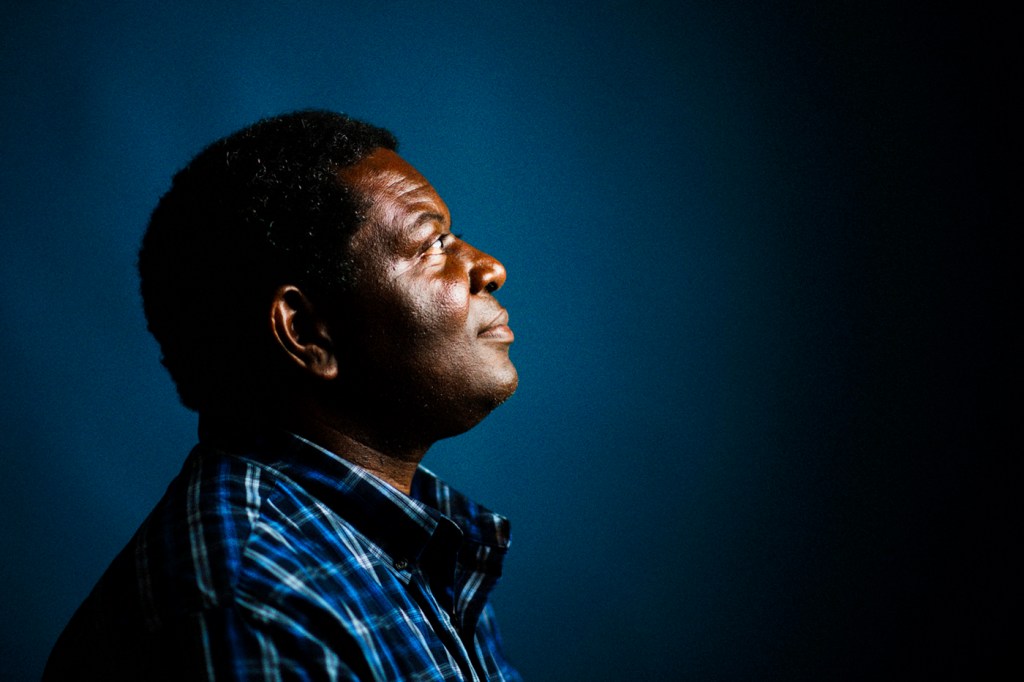Northeastern professor Alfred Brownell is awarded Goldman Environmental Prize for grassroots environmental activism in Africa

Alfred Brownell has devoted the last decade to preserving the rainforests and other natural resources of Liberia.
In his office at Northeastern’s School of Law, as he tells his story of persecution and escape, from Africa to Northeastern, Brownell is interrupted by silence.
He sits quiet and still, even as the first tears appear from the outer corner of his right eye.
They trickle into a flow as Brownell struggles to manage his sobbing. His memories thunder and squall like a storm passing through, as he considers the day, five years ago, when his life was nearly taken from him, and all the days since devoted to the repayment of his good fortune.
On Monday, Brownell was awarded the Goldman Environmental Prize, the world’s most prestigious honor for the half-dozen grassroots environmental activists who receive it annually. The prize was established in San Francisco in 1989 by Richard and Rhoda Goldman, founders of the Goldman Fund, which for six decades donated $700 million to nonprofit organizations that were trying to make the world a better and safer place.
Brownell has been committed to that same goal, even as his own existence has grown traumatic and dangerous.
“We are in a war for this planet,” says Brownell, who trained for his self-made role by graduating from the Louis Arthur Grimes School of Law at the University of Liberia.
In 2009, Brownell formed Green Advocates International, Inc., a non-profit public interest environmental law organization that has used legal means to protect the natural resources of Liberia against the plundering by agricultural, logging, and mining companies that have been seizing the forests and other public and private lands with the assistance of the Liberian government.
“It’s not just a struggle to protect remote towns and villages, or just to protect their sacred sites, or just to protect their land and their crops, their way of life, their culture, their religion,” Brownell says. “It’s also about protecting these important forests in West Africa, which are producing oxygen and absorbing carbon and, in essence, making an enormous contribution in the mitigation of climate change.”
The Goldman Prize is an acknowledgment of Brownell’s successful efforts to protect the Upper Guinean rainforest from agro-industrial development that has destroyed farmlands, polluted water sources, and caused great harm to the cultures and livelihoods of the affected inhabitants.
“Under threat of violence, environmental lawyer and activist Alfred Brownell stopped the clear-cutting of Liberia’s tropical forests by palm oil plantation developers,” the prize organizers announced Monday. “His campaign protected 513,500 acres of primary forest that constitute one of the world’s most important biodiversity hotspots, enabling indigenous communities to continue their stewardship of the forest.”
Goldman Prize recipients have often conducted their work at great personal risk, according to the selection committee. In 2014, while Brownell was returning from an inspection of a Liberian forest that he was trying to save, his car was among those stopped by a mob of 150 men armed with machetes, guns, and other weapons. They made it clear they were intending to murder and cannibalize him.
As Brownell sat locked in his car, he was approached by a local chief who, Brownell believed, was taking money from the plunderers. In a shocking turn, the chief decided to spare him from his would-be killers.
Two years later, amid a spree of surveillance, phone-tapping and the burglary of his office, Brownell learned of a warrant for his arrest. Alongside his wife and two children, he escaped on a flight to Boston with the help of an international network of lawyers and human rights advocates—including Northeastern’s Program on Human Rights and the Global Economy, which installed him in January 2017 as a visiting scholar at the Boston campus.
Brownell is now a Distinguished Scholar in Residence at the Northeastern School of Law. Additionally, Brownell last year became the first at Northeastern to hold the Institute of International Education Scholar Rescue Fund Beau Biden Chair. The chair was created in 2016 to honor the legacy of Beau Biden, the former attorney general of Delaware. The son of former Vice President Joe Biden, Beau died in 2015 from brain cancer.
Brownell has expressed gratitude to Northeastern President Joseph E. Aoun and the entire university community for supporting him, his family, and his work.
“I am just the voice,” Brownell says. “My work is well known around the world, and when I had problems, my friends right here, they pulled me out. But no one knows who these other folks are—these tens of thousands of indigenous villagers. Nobody knows their names, nobody knows their faces. I hope this prize puts a name to their faces, so that people will get to see who they are, and see their struggle.”
Molly Callahan contributed to this report. For media inquiries, please contact media@northeastern.edu.






